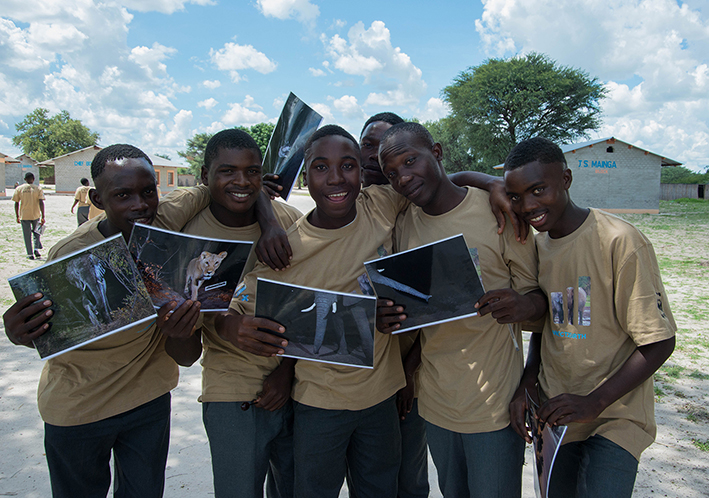The WWF is run at a local level by the following offices...
- WWF Global
- Adria
- Argentina
- Armenia
- AsiaPacific
- Australia
- Austria
- Azerbaijan
- Belgium
- Bhutan
- Bolivia
- Borneo
- Brazil
- Bulgaria
- Cambodia
- Cameroon
- Canada
- Caucasus
- Central African Republic
- Central America
- Chile
- China
- Colombia
- Croatia
- Democratic Republic of the Congo
- Denmark
- Ecuador
- European Policy Office
- Finland
CONSERVATION PULSE
MARCH 2018

Earth Hour 2018 unites people for the planet
“Once again, the people have spoken,” said Marco Lambertini, WWF’s Director General, as almost 8,000 of the world’s landmarks doused their lights, and individuals, businesses and organizations in a record 188 countries and territories joined Earth Hour. The event, launching the 2020-focused campaign Connect2Earth, sent out a strong message to decision makers that now is the time to act to stop the destruction of global biodiversity – the huge variety of animals and plants on Earth and the places where they live. For the first time, people joined the conversation on Connect2Earth to share why nature matters to them – and encourage others to think about their own connections. And people across the globe generated 3.5 billion impressions of #EarthHour, #connect2earth and related hashtags to show their concern. We need to reset the global agenda to make reversing the loss of nature a priority – and Earth Hour and Connect2Earth will play a key role in making this happen in the coming years.

Declaration for Pantanal, world's largest wetland
Bolivia, Brazil and Paraguay have signed the Pantanal Declaration, which ensures that all future development in the area, at 17 million hectares the world’s largest tropical wetland, is sustainable – balanced for the needs of wildlife and people alike. Millions of people living downstream of the Pantanal, which is home to 4,700 animal and plant species, depend on its natural resources and services, including flood control, groundwater recharge, river flow for navigation and carbon absorption. All of this could be threatened by inadequate planning in any of the three countries. WWF assisted in the development of the declaration, which follows years of collaboration between the three governments. Through it, the countries have formalized their shared responsibility to steward the sustainable development of this vital resource that will secure a prosperous future for one of the planet’s most biologically diverse areas.

Tech companies unite against wildlife traffickers
Twenty-one world-leading tech companies from across the world, including giants Alibaba, Baidu, Google, Microsoft and Tencent, have joined WWF, TRAFFIC, and the International Fund for Animal Welfare (IFAW) to form the Global Coalition to End Wildlife Trafficking Online. The companies have pledged to work together to collectively reduce wildlife trafficking across platforms by 80 per cent by 2020, with each company developing and implementing policies and solutions to help end the practice. “Criminals are making a killing from selling rare species and products made from their parts,” said Crawford Allan, WWF’s Senior Director of Wildlife Crime and TRAFFIC, and it takes just minutes to find dubious and largely illegal wildlife for sale online – everything from elephant ivory carvings to live animals including tiger cubs. Bringing these industry giants together is a major step towards systematically closing the web to wildlife traffickers.

New pathway for sustainable ocean investment
A new financial framework, which shows how profitability can go hand-in-hand with securing the health of our oceans, has been unveiled. The Sustainable Blue Economy Finance Principles, developed through a consultation led by the European Commission, WWF, the Prince of Wales’s International Sustainability Unit and the European Investment Bank, were showcased at the World Ocean Summit 2018 in Cancún, Mexico. “Reconciling economic development with ocean ecosystems that are already showing stress is one of the great challenges facing humanity. The role of the finance and investment community in finding a pathway to genuine sustainability is vital. We welcome additional signatories to this critical initiative as well as strong partnerships to ensure their success,” said WWF International’s President Pavan Sukhdev.

WWF and the World Organization of the Scout Movement (WOSM) are deepening their collaboration, which began back in 1973, to drive global awareness and action on nature and the environment. “With 50 million Scouts worldwide, we are excited to join forces to create the global momentum needed to inspire young people into creating a sustainable future – and planet – for all,” said WWF Director General Marco Lambertini. The partnership will work to help increase understanding among hundreds of millions of people of the value and critical condition of biodiversity across the planet. As part of its commitment to nature, WOSM has established a network of Scout Centres of Excellence for Nature and the Environment (SCENES) around the world, to enable Scouts, local communities and visitors to engage with the natural world.

Involving civil society in protecting nature
The UNESCO World Heritage Convention works to protect the world’s most valuable and iconic natural and cultural sites. For the past two years, WWF − through our Together Saving Our Shared Heritage campaign − has been seeking new ways to strengthen access to the Convention by civil society (the variety of non-governmental and non-profit organizations globally) and ensure that its voice is both heard and valued. This momentum led to WWF organizing a workshop in Paris in March that brought stakeholders together to discuss how to increase civil society participation. We also successfully called for consultation with civil society on developing the Compendium of Policy for the World Heritage Convention. This document will help governments establish adequate mechanisms in their national legislation, heritage protection and conservation activities.